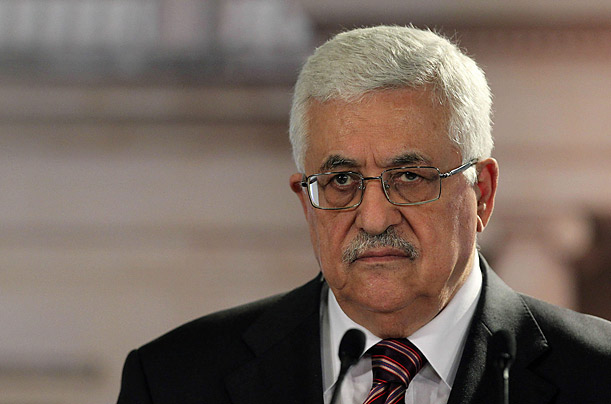President of Palestinian National Authority Mahmoud Abbas, October 11, 2011. (Photo: Mauricio Duenas / EPA)
When rival Palestinian factions Fatah and Hamas agreed to bury the hatchet in Cairo , the reconciliation pact promised two things: New elections by May 2012, and a caretaker government of technocrats to run the Palestinian Authority until then. That was more than five months ago, and ever since the two sides have been jammed up on the question of who should run the interim government. With no resolution in sight, Fatah chief and PA president Mahmoud Abbas is proposing to skip the caretaker part and go straight to elections, senior Abbas aide Nabil Abu Rudeineh tells TIME.
“We’re suggesting January, because the law requires 90 days notice,” says Abu Rudeineh. He adds that the proposal has been extended to Hamas informally but will not be officially on the table until Abbas meets with Hamas officials, probably early next month in Cairo. Both Abbas and Hamas chief Khaled Mashal will be in Egypt this week, but the Fatah chief, whose titles include chairman of the PLO, says the brief visit will be filled by meetings with the military leaders in Cairo. “I don’t have time, only one night,” Abbas says in an interview. “Maybe next time, by the beginning of next month.”
If Hamas agrees, the stage will be set for an overhaul in Palestinian politics, and with it relations with Israel, the United States and a rapidly changing Middle East. The Palestinian Authority will almost certainly have a new president: Abbas, 76, has repeatedly insisted — to TIME as recently as last week — that he will not run for re-election, and has ordained no successor from the rolls of Fatah, the secular movement that long dominated Palestinian politics but is burdened with a reputation for corruption and incompetence. In fact the only previous time Fatah and Hamas faced off in elections, in January 2006 balloting for the Palestinian legislature, Hamas’surprise victory was regarded in no small part as a protest vote against Fatah’s unresponsive reign.
(SEE: Pictures of life in Gaza under Hamas.)
But the Islamist party has problems of its own. Analysts say it was widely viewed as the aggressor in the brief 2007 civil war that drove Fatah out of Gaza, a brutal internecine conflict that appalled Palestinians. With a boost from the Arab Spring, the public impatience with the ongoing rift forced the reconciliation the two parties signed in Cairo last spring. Hamas also is burdened by low polls for its governance of Gaza, its longtime stronghold. As recently as March, a majority of Gazans said they supported “regime change.”
The group got a significant boost this week, however, by winning freedom for 1,027 Palestinian prisoners from Israeli jails in exchange for Gilad Shalit, the young Israeli corporal Hamas held for five years after abducting him in a joint operation with other militant groups. The massive release stole the spotlight from Abbas, who just two weeks earlier was greeted as a conquering hero after defying President Obama at the United Nations by submitting an application for Palestinian statehood. His offer of elections may well burnish the U.N. application, as a statesman-like display of confidence in democracy. But the Shalit deal is structured to keep Hamas’ success in the limelight: Roughly half the 1,027 were released Tuesday; the other half will be freed, amid similar hoopla, in two months.
(READ: Isolated and impoverished — why Hamas is losing in Gaza.)
New balloting would also give Palestinian a working legislature for the first time in years. The Palestinian Legislative Council elected in 2006 and seated in Ramallah has not met since the split between Gaza and the West Bank a year later. During that time, Abbas (whose own term actually expired in 2009) has ruled by fiat, while each faction persecuted the other, with Israeli troops arresting some Hamas parliamentarians on the West Bank. In fact, how Israel would respond to a government that includes Hamas is one of the major uncertainties embedded in any new elections. When the reconciliation was announced, Prime Minister Benjamin Netanyahu tried to pour cold water on it, saying Israel would refuse to negotiate with a Palestinian government that included a faction committed to Israel’s annihilation, as Hamas’ charter states. But that statement may no longer be in effect after the Shalit deal, which was nothing if not a negotiation with Hamas.
Finally, the prospect of early elections casts a new light on Abbas’ demand that Netanyahu make good on a promise by his predecessor as prime minister to release still more Palestinian prisoners in the wake of the Shalit deal. Among more than 5,000 Palestinians still in Israeli prisons is one who polls consistently show winning the presidency of the Palestinian Authority — Marwan Barghouti. In some polls, the Fatah activist wins even if he runs from his cell.

